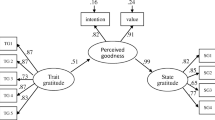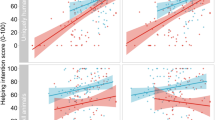Abstract
Gratitude and indebtedness have often been equated in psychology. Emerging research, however, suggests that these emotions are experienced differently and occur in response to different situations (Gray, Emmons, & Morrison, 2001). The current set of experiments investigated the effects of helper intention on grateful and indebted reactions to a favor. Study 1 utilized scenario methodology to present participants with a favor that was given with benevolent or ulterior motives. Participants felt significantly more grateful when the helper had benevolent intentions. Reactions of indebtedness did not vary as a function of helper intention. In Study 2, participants recalled favors that had been done for them for either unselfish or selfish reasons. Participants reported significantly more gratitude for the favor when they were instructed to recall an unselfish favor. Levels of indebtedness were not affected by helper intention. Study 3 provided participants with an ambiguous favor scenario to better assess individuals' natural reactions to receiving help, and replicated the results of Study 1. Together, these three experiments provide support for differences between grateful and indebted emotions.
Similar content being viewed by others
Notes
The author would like to thank an anonymous reviewer for pointing this out.
Lack of gender information for these 24 participants was due to an experimenter error, and not to an unwillingness to disclose gender on the part of the individual participants.
References
Ames, D. R., Flynn, F. J., & Weber, E. U. (2004). It's the thought that counts: On perceiving how helpers decide to lend a hand. Personality and Social Psychology Bulletin, 30, 461–474
Bar-Tal, D., Bar-Zohar, Y., Greenberg, M. S., & Hermon, M. (1977). Reciprocity behavior in the elationship between donor and recipient and between harm-doer and victim. Sociometry, 40, 293–298.
Ellsworth, P. C., & Smith, C. A. (1988). Shades of joy: Patterns of appraisal differentiating pleasant emotions. Cognition and Emotion, 2, 301–331.
Emmons, R. A., & Crumpler, C. A. (2000). Gratitude as a human strength: Appraising the evidence. Journal of Social and Clinical Psychology, 19, 56–69.
Fisher, J. D. (1983). Recipient reactions to aid: The parameters of the field. In J. D. Fisher, A. Nadler, & B. M. DePaulo (Eds.), New directions in helping (Vol. 1, pp. 3–14). New York: Academic Press.
Gallup, G. H., Jr. (1998 May). Thankfulness: America's saving grace. Paper presented at the National Day of Prayer Breakfast, Thanks-Giving Square, Dallas.
Gouldner, A. W. (1960). The norm of reciprocity: A preliminary statement. American Sociological Review, 25, 161–178.
Graham, S. (1988). Children's developing understanding of the motivational role of affect: An attributional analysis. Cognitive Development, 3, 71–88.
Gray, S. A., Emmons, R. A., & Morrison, A. (2001 August). Distinguishing gratitude from indebtedness in affect and action tendencies. Poster presented at the annual meeting ofthe American Psychological Association, San Francisco, CA.
Greenberg, M. S. (1980). A theory of indebtedness. In K. J. Gergen, M. S. Greenberg, & R. H. Willis (Eds.), Social exchange: Advances in theory and research (pp. 3–26). New York: Plenum Press.
Hegtvedt, K. A. (1990). The effects of relationship structure on emotional responses to inequity. Social Psychology Quarterly, 53, 214–228.
Lane, J., & Anderson, N. H. (1976). Integration of intention and outcome in moral judgment. Memory and Cognition, 4, 1–5.
Mayer, J. D., Salovey, P., Gomberg-Kaufman, S., & Blainey, K. (1991). A broader conception of mood experience. Journal of Personality and Social Psychology, 60, 100–111.
Lazarus, R. S., & Lazarus, B. N. (1994). Passion and reason: Making sense of our emotions. New York: Oxford University Press.
McCullough, M. E. (2002). Savoring life, past and present: Explaining what hope and gratitude share in common. Psychological Inquiry, 13, 302–304.
Ortony, A., Clore, G. L., & Collins, A. (1988). The cognitive structure of emotions. Cambridge: Cambridge University Press.
Regan, D. T. (1971). Effects of a favor and liking on compliance. Journal of Experimental Social Psychology, 7, 627–639.
Roberts, R. C. (1991). Virtues and rules. Philosophy and Phenomenological Research, 51, 325–343.
Tesser, A., Gatewood, R., & Driver, M. (1968). Some determinants of gratitude. Journal of Personality and Social Psychology, 9, 233–236.
Tsang, J. (2006). Gratitude and prosocial behavior: An experimental test of gratitude. Cognition and Emotion, 20, 138–148.
Tsang, J., & McCullough, M. E. (2004). Annotated bibliography of research on gratitude. In R. A. Emmons & M. E. McCullough (Eds.), The psychology of gratitude (pp. 291–341). New York: Oxford University Press.
Watkins, P. C., Scheer, J., Ovnicek, M., & Kolts, R. (2006). The debt of gratitude: Dissociating gratitude and indebtedness. Cognition and Emotion, 20, 217–241.
Weiner, B., Russell, D., & Lerman, D. (1978). Affective consequences of causal ascriptions. In J. H. Harvey, W. J. Ickes, & R. F. Kidd (Eds.), New directions in attribution research (Vol. 2). Hillsdale, N.J.: Erlbaum.
Weiner, B., Russell, D., & Lerman, D. (1979). The cognition-emotion process in achievement related contexts. Journal of Personality and Social Psychology, 37, 1211–1220.
Whatley, M. A., Webster, J. M., Smith, R. H., & Rhodes, A. (1999). The effect of a favor on public and private compliance: How internalized is the norm of reciprocity? Basic and Applied Social Psychology, 21, 251–259.
Aknowledgments
The author would like to express appreciation to Wade Rowatt for his comments on an earlier draft of this manuscript, and to thank the following individuals for data-collection assistance: Diana Castillo, Aline Defreitas, Courtney Drew, Brandi Glaspie, Amy Harper, Tonya Hyde, Tiara Mason, Vanessa Mizutowicz, Sara Pierce, Maricela Rábago, Kimberly Reeves, and Jason Vollmecke
Author information
Authors and Affiliations
Corresponding author
Rights and permissions
About this article
Cite this article
Tsang, JA. The Effects of Helper Intention on Gratitude and Indebtedness. Motiv Emot 30, 198–204 (2006). https://doi.org/10.1007/s11031-006-9031-z
Received:
Accepted:
Published:
Issue Date:
DOI: https://doi.org/10.1007/s11031-006-9031-z




